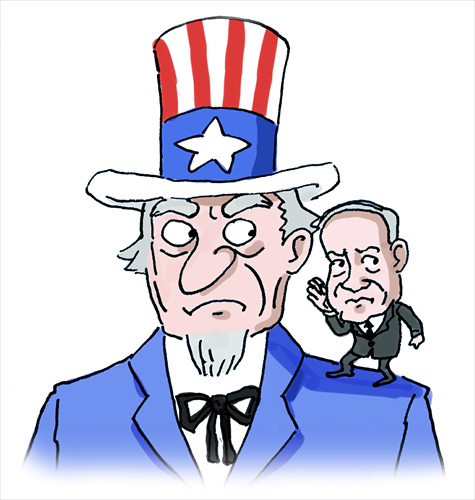Iran framework agreement could still be sabotaged

Illustration: Liu Rui/GT
The framework agreement with Iran regarding its nuclear program is a welcome diplomatic success. It remains to be seen, however, whether it will be sabotaged by the West and Israel.
The final deadline for a comprehensive agreement is June 30. Between now and then the framework will be filled in with the technical details needed for a final agreement. The final agreement is to be validated by the UN Security Council and thus become part of international law.
There are two sets of economic sanctions against Iran. One set is that of the UN and the other set comprises the unilateral sanctions of the US. In return for agreement all sanctions are to be ended.
Iran's original nuclear energy program began with cooperation with the US under the "Atoms for Peace" program of the Eisenhower administration in the 1950s.
Iran is a signatory of the Nuclear Non-Proliferation Treaty (NPT). As a signatory to the NPT, Iran has the same legal right for the peaceful use of nuclear energy as do other signatories.
The US intelligence community back in 2007 in a National Intelligence Estimate assessed that Iran ended all "nuclear weapon design and weaponization work" in 2003.
This official assessment has not changed fundamentally since 2003 but ever since US politicians and the pro-Israel lobby have raised the false specter of a phantom Iranian nuclear weapons program.
In 2011 the International Atomic Energy Agency (IAEA), under US pressure, criticized Iran for its pre-2003 nuclear program. This opened the door for politicians and lobbyists to conflate the pre-2003 program with false allegations of supposed nuclear weapons program since 2003.
As has become the practice in recent years, US politicians ignore the US intelligence community and attempt to manipulate it. The example of the lies about Iraqi weapons of mass destruction as a pretext for the Bush administration's Iraq war is a well-known example.
A similar process of the political fabrication of falsehoods about Iran has also taken place, spurred by the pro-Israel lobby.
The posturing against Iran by Republicans today in the US Congress was taken to a new level with the recent bizarre letter of 47 senators to the Iranian leadership. The letter followed an unprecedented appearance by the Israeli leader speaking to a joint session of Congress with intention to undermine the negotiation process with Iran.
Will the framework agreement be sabotaged by the West and Israel?
This is an open question. The framework agreement today embodies the essential elements of an agreement Iran signed with the EU-3 (UK, France, Germany) back in 2003.
This "Tehran Declaration" emphasized Iran's legal right to enrich uranium under Article IV of the NPT. Iran agreed to voluntarily halt enrichment activities to allow the IAEA to establish a baseline for monitoring activity. After establishing a monitoring baseline Iran was to be permitted to resume enrichment activity.
At this stage, the US intervened with a false and hysterical interpretation of evidence from a suspect laptop computer alleging an Iranian nuclear weapons program. This of course followed the US pattern of disinformation and propaganda used to launch the war against Iraq.
Owing to this US sabotage of a European initiative, Iran not surprisingly withdrew from negotiations with the EU-3. Former US president George W. Bush had already poisoned the waters with Iran by his notorious "axis of evil" speech at the beginning of 2002.
Various pressures and sanctions against Iran followed over the past decade. The EU-3 and not Iran broke the Tehran Declaration agreement of 2003.
So now 12 years later, the international community is back to where it stood in 2003 prior to the US and the EU-3 sabotaging an agreement with Iran.
Given the influence of the pro-Israel lobby over Washington, it is too early to draw any conclusions about the viability of the framework agreement. The international community can only hope for the best.
The author is an educator and former senior professional staff member of the Senate Committee on Foreign Relations. opinion@globaltimes.com.cn